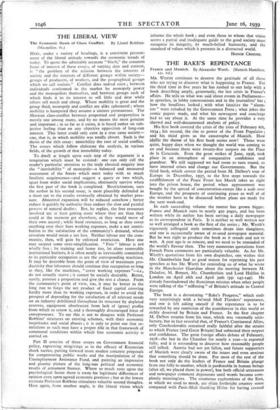THE RAKE'S REPENTANCE
MR. WEirrn continues to deserve the gratitude of all those who are trying to discover what is happening to France. For the third time in five years he has rushed to our help with a book describing amply, generously, the last crisis in France's affairs. He tells us what was said about events in Parliament— in speeches, in lobby conversations and in the journalists' bar ; how the headlines looked ; with what fatuities the " alarm- ists " were rebuked by the Government Press ; what jokes the comic papers made, and what his newsagent and concierge had to say about it. At the same time he provides a very shrewd and well-documented analysis of policy.
His first book covered the crisis of the riots of February 6th, 1934 ; his second, the rise to power of the Front Populaire ; and his third gives us the catastrophe of Munich. How idyllic the theme of his first book seems now ! Those were quiet, happy days when we thought the world was coming to an end because there were twenty-five corpses on the Place de la Concorde. Even the great strikes of June, 1936, took place in an atmosphere of comparative confidence and grandeur. We still supposed we had room to turn round, to have internal crises and change our Governments. But the third book, which covers the period from M. Delbos's tour of Europe in December, 1937, to the first steps towards the establishment of the Peace Front last March takes us right into the prison house, the period when appeasement was bought by the spread of concentration-camps like a scab over Europe, and the prospects of continuing peace as well a§ of the weather have to be discussed before plans are made for the next week-end.
In each succeeding volume the matter has grown bigger. France and Munich runs to nearly 45o pages, and has been written while its author has been serving a daily newspaper as its correspondent in Paris. It is neither so well written nor so well arranged a book as the first of the series ; Mr. Werth's vigorously colloquial style sometimes drops into slanginess, and one is occasionally aware of re-used newspaper material. But he was right to produce the book as it stands and not to wait. A year ago is so remote, and we need to be reminded of the world's flavour then. The very numerous quotations from French Press comments are particularly valuable. As for Mr. Werth's quotations from his own dispatches, one wishes that Mr. Chamberlain had as good reason for reprinting his past speeches as has Mr. Werth for reminding us of what he wrote in the Manchester Guardian about the meeting between M. Daladier, M. Bonnet, Mr. Chamberlain and Lord Halifax in London on April 26th and April 30th (pp. 145-149). He already foreshadowed the Runciman mission when other people were talking of the " stiffening " of Britain's attitude to Central Europe.
The book is a devastating " Rake's Progress," which ends very surprisingly with a belated Moll Flanders' repentance, and one is left asking oneself if the repentance is to be rewarded by any remission of the punishment in this world so richly deserved by Britain and France. In the first chapter M. Delbos returns from his tour, which was externally satis- factory, but in fact revealed that, of France's Continental Allies, only Czechoslovakia remained really faithful after the strains to which France (and Great Britain) had subjected their respect and confidence. The great foreign affairs debate of February, 1938—the last in the Chamber for nearly a year—is reported fully, and it is astounding to discover how reasonably people still talked. Austria had not yet fallen, and future supporters of Munich were clearly aware of the issues and even anxious that something should be done. For most of the rest of the book not only do the leaders of France and Britain plunge from one folly to another, which is pardonable in human beings (after all, we placed them in power), but both official utterances and newspaper comment degenerate until words become com- pletely meaningless. The courteous euphemisms of the East, at which we used to mock, are plain forthright country sense compared with Paris-Midi thanking Hitler for having created
a détente by sending an ultimatum (page 260) and Colonel de Is Rocque (page 266) commenting solemnly on France's abandonment of Czechoslovakia in these words: " Eternal France alone was qualified for such an act of arbitration. Such is the noble tradition, the great destiny, the magnificent fortune of our country! "
In the last section of the book we watch France and Britain struggling back through relapses to sobriety. Things begin to assume their own names and we rediscover reality, grown more terrible during the delirium, but still at least tangible. The book ends on an almost cheerful note after Britain and France have extended their guarantee to Poland and M. Reynaud has declared that France has not abdicated in Europe. Today the Kolnische Zeitung is telling its readers that the French State has recovered its dynamic quality.
Mr. Werth cannot be expected in this crowded book to discuss the question how France and Britain could temporarily abdicate all sense and dignity. He would seem to miss some clues to this problem by carrying over from spring, 1936, a too favourable estimate of the Front Populaire, for he certainly understates the provocation under which M. Chautemps was smarting when as Premier he twice threw in his hand at the beginning of 1938. At all events, it is evident that the best medicine for the disease from which the two countries have suffered is action with its inevitable contact with reality. As soon as France mobilised, one was conscious of healthy flesh























































 Previous page
Previous page